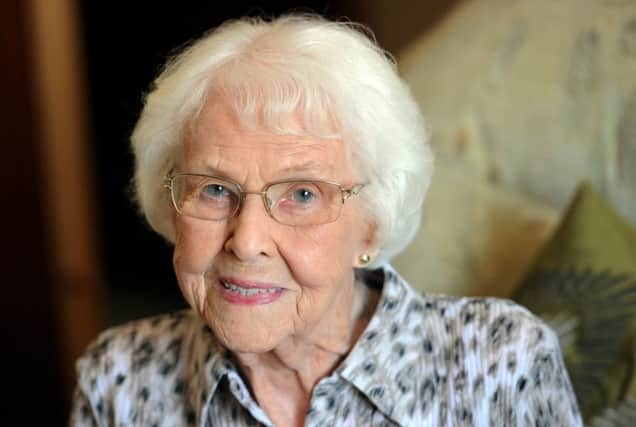Obituary: Dorothy Furness, wireless operator and codebreaker


Last year Dorothy Furness’s silence of more than half a century was broken when she was recognised for her work during the Second World War at Bletchley Park and honoured by David Cameron. Her grandson, Pete, on discovering of the secretive work his grandmother had carried out applied for the Bletchley Medal on her behalf. Her name also appears on the Roll of Honour at Bletchley, the central site for Britain’s codebreakers during the war – so secret it did not appear on any map.
She did not let on to any of her family – two sons, five grandchildren and four great-grandchildren – of her service for many years. Furness, like all her former colleagues at Bletchley, was forbidden from talking of their wartime experiences. They had all signed the Official Secrets Act and, had they spoken of their service, they would have been prosecuted.
Advertisement
Hide AdAdvertisement
Hide AdFurness worked at Bletchley as a wireless operator and a code-breaker. She was under intense pressure and had to remain at her station for long hours. The work she and her colleagues did was vital to the war effort and many of the highly confidential orders from Hitler in Berlin to his High Command were decoded and read first in Bletchley. One Bletchley historian said: “It was almost as if Furness and her friends were a fly on the wall of the German commanders in the field.”
Dorothy Furness (nee Ingleby) was born in Newcastle-upon-Tyne where she worked as a beautician. On the outbreak of war she was posted to the Women’s Auxiliary Air Force, though she did not join the WAAFs for a year as the family home had been bombed and her parents and sister were severely injured.
Dorothy began her wireless training in Blackpool where she proved a most able transmitter of coded messages: “It was a new challenge as I had never been around equipment like that,” she said. “I loved it.” She was posted to Mere Branston in Lincolnshire in 1941 and then served for the rest of the war at Chicksands in Bedfordshire, an important outstation for Bletchley. Dorothy was an integral member of the code-breaking and wireless operating team.
The teams of women operators proved a vital input in the success of the deciphering. They were fast, accurate and, significantly, were considerably better than their counterparts in Germany who simply did not believe any of their messages could be broken.
The process was painstaking. A Bletchley Park official told The Scotsman: “Deciphering was a lengthy process and required endless perseverance and patience. Enigma decrypting was so involved and complex it required six code breakers for every message. I am sure she was part of those teams, but because of the secrecy, records are incomplete and have not been kept.”
Dorothy tracked the enemy radio “nets” up and down the dial, carefully logging every letter or figure. The messages were then sent back to Bletchley Park (known as Station X) to be deciphered, translated and fitted together like a gigantic jigsaw puzzle to produce a picture of what the enemy was doing.
Special Liaison Units were set up to feed the Bletchley Park intelligence. The crucial intelligence was then passed on to the commanders in the various theatres of war, especially North Africa and then France after D-Day. The deciphering process often provided the Allied Command with crucial German troop movements and the build-up at naval bases.
The secrecy connected with the cracking of the German Enigma code and the conditions under which the codebreakers operated was dramatically captured in the recent film The Imitation Game starring Benedict Cumberbatch.
Advertisement
Hide AdAdvertisement
Hide AdYears later Dorothy said: “We didn’t realise at the time we were doing such important work. We were just one of many. We took down the code messages and they were relayed through a special key back to Bletchley, and couldn’t be intercepted.”
After the war, she returned to Newcastle and quietly resumed normal life – never telling work colleagues or friends of her challenging years during the war.
She returned to her work as a beautician and then one day a former bomber pilot, Norman Furness, came into the shop and was too shy to ask her out so he passed a note to another assistant. The couple did have a drink together and were married in 1950. She devoted much of her married life to bringing up her two boys, though she also worked at Marks & Spencer.
She moved up to Aberdeenshire a decade ago to be nearer her family and lived among her memories with paintings of bombers flown by her late husband on the walls and Bletchley mementoes on the coffee table.
Norman died in 2004. Dorothy is survived by her two sons.